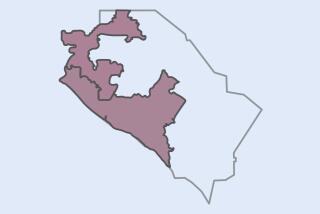Koreans Denied Bid to Join Suit on Redistricting
- Share via
A claim by Los Angeles’ Korean community that its voting rights were violated by the City Council’s redistricting plan was thrown out of court Monday by a U.S. district judge who said there are not enough Koreatown residents to constitute a minority under the federal Voting Rights Act.
Judge James M. Ideman expressed sympathy with the Korean community but rejected its attempt to be named as intervenors, or co-plaintiffs, in a U.S. Department of Justice lawsuit against the city. The suit charges that as presently mapped, council districts deprive Latinos of fair representation on the council.
The Korean-Americans contended that under the present redistricting, their political power, too, is unfairly diluted because it divides Koreatown into three districts. They had sought a decision unifying Koreatown in one district.
Cites N. Carolina Case
Ideman refused, citing a North Carolina case in July in which the Supreme Court held that minority communities must show that they are geographically and politically unified and have the votes to control one electoral district. In Los Angeles, that would mean that the community must have 99,001 voters, one more than half of the average council district population of 198,000, Ideman said.
“You don’t have the numbers, not yet,” the judge said. “I just don’t think your time has come yet.”
Los Angeles’ Korean population in the 1980 census, on which redistricting is based, was 33,066.
Ideman likewise signaled his intention to remove representatives of the local Chinese community from their position as intervenors on similar grounds. He said he would rule in the future, when Chinese community attorneys are present in court.
Federal figures show that 44,353 Los Angeles residents of Chinese extraction were counted during the 1980 census.
Also rejected as co-plaintiffs in the case Monday on grounds the voting rights measure did not apply to them was a coalition of Wilshire district homeowner groups who had challenged the redistricting plan as “gerrymandering.” The plan would split the Wilshire residential neighborhood into two districts in a move residents say would weaken their political influence.
Together, the decisions would leave three plaintiffs in the long-running redistricting dispute--the Justice Department, the Mexican American Legal Defense and Educational Fund and the NAACP.
Seeking to derail the lawsuit, the City Council approved a redistricting plan in July that created a new Latino-dominated council seat. The council has since tentatively approved another plan, which is not before the court now but which also divides Koreatown into three districts.
More to Read
Sign up for Essential California
The most important California stories and recommendations in your inbox every morning.
You may occasionally receive promotional content from the Los Angeles Times.














